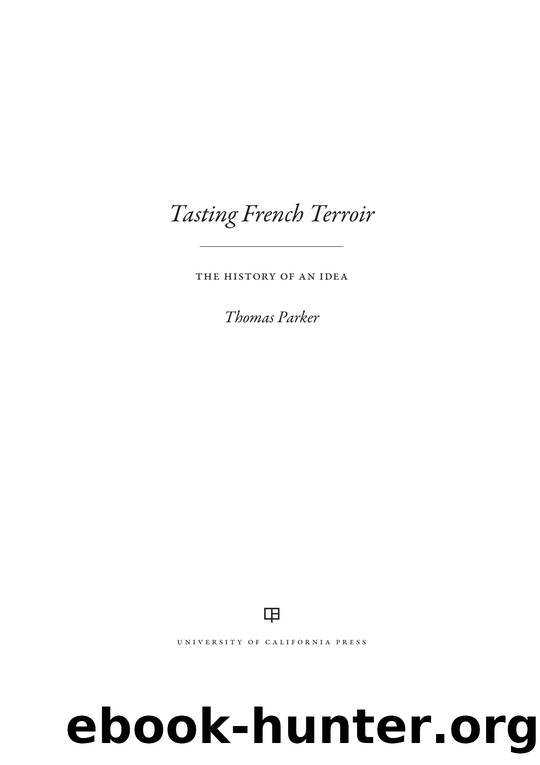Tasting French Terroir by Parker Thomas;

Author:Parker, Thomas;
Language: eng
Format: epub
Publisher: University of California Press
IMPLICATIONS OF DU BOS’S IDEAS ON BEAUTY
Although Du Bos explicitly advanced his theories on the amicable relationships between the Franks and Gauls in 1734 to resolve the debate between royalists and nobles, his more effective argument for the promotion of social accord was diffused obliquely over a decade earlier, in his work defining a climate-based conception of identity. There, he specifically invoked the effect of terroir on identity three decades before Montesquieu propounded his own wide-reaching theories on climatic determinism. It was at least partially the popularity of Du Bos’s theories—and the escape they allowed from what was perceived as Boulainvilliers’s biological elitist ideas—that began to reverse the aversion for the earth that occurred in the seventeenth century. The irony is that these theories promoted a different sort of racism, suggesting hierarchical differences based on geographic locales.21 This is the way that it would appear later in Buffon’s Natural History, where Buffon, supporting a theory of monogenesis, opined that although black people and white people came from the same race, the inferiority of the warmer climate in Africa had led to degradation of the species in blacks.22
In his Réflexions critiques sur la poésie et sur la peinture, Du Bos set out to explain the origins of aesthetic values. Since seventeenth-century thinkers had insisted that taste and class were strongly correlated, it is striking that Du Bos constructs his paradigm based on taste and nation, omitting class as a priority. He also raises the status of terroir, changing it from a negative descriptor for food and people into an identifying characteristic of the climate and a key to determining the aesthetic tastes of a population.
In reinforcing connection with the earth in terms of aesthetics—the very connection that had been cast into opprobrium in the seventeenth century—Du Bos also undermines the claims of biological superiority that were made by proponents of a pure-blooded, Frankish race. Although Du Bos does not specifically point to terroir and climate as a source of nation building, his reasoning gave like-minded readers the ammunition they would need to defeat Boulainvilliers. In this regard, it is not insignificant to note that Du Bos was familiar with Bodin and Broekhuisen as well as with Fontenelle and Jean Chardin, and their writings on environmental determinism.23 In fact, his initial approach to the subject seems to simply reiterate standard climate theory, echoing the thoughts of previous authors. Du Bos characterizes the climates of other lands as deviating from perfection and provides a long list of countries that are inferior because of environmental conditions, juxtaposing them with France, which is perfectly situated in a moderate climate. Here again, his paradigm resembled the vision of terroir proposed in the previous century: France had the best climate, since it was perfectly neutral and balanced. France was ideal not for the qualities that the terroir instilled, but for the qualities that it did not instill.
Du Bos illustrates his point with examples of the extremes found in countries with less benevolent climates, such as that of
Download
This site does not store any files on its server. We only index and link to content provided by other sites. Please contact the content providers to delete copyright contents if any and email us, we'll remove relevant links or contents immediately.
Biscuits: A Savor the South Cookbook by Belinda Ellis(4193)
A Jewish Baker's Pastry Secrets: Recipes from a New York Baking Legend for Strudel, Stollen, Danishes, Puff Pastry, and More by George Greenstein(3432)
Al Roker's Hassle-Free Holiday Cookbook by Al Roker(3403)
Ottolenghi Simple by Yotam Ottolenghi(3400)
The French Women Don't Get Fat Cookbook by Mireille Guiliano(3384)
Better Homes and Gardens New Cookbook by Better Homes & Gardens(3348)
Trullo by Tim Siadatan(3276)
Bake with Anna Olson by Anna Olson(3259)
Hot Thai Kitchen by Pailin Chongchitnant(3179)
Panini by Carlo Middione(3137)
Nigella Bites (Nigella Collection) by Nigella Lawson(3077)
Momofuku by David Chang(3034)
Modern French Pastry: Innovative Techniques, Tools and Design by Cheryl Wakerhauser(3011)
Salt, Fat, Acid, Heat: Mastering the Elements of Good Cooking by Nosrat Samin(2975)
Best of Jane Grigson by Jane Grigson(2848)
Tapas Revolution by Omar Allibhoy(2824)
Classic by Mary Berry(2816)
Solo Food by Janneke Vreugdenhil(2803)
The Club by A.L. Brooks(2727)
